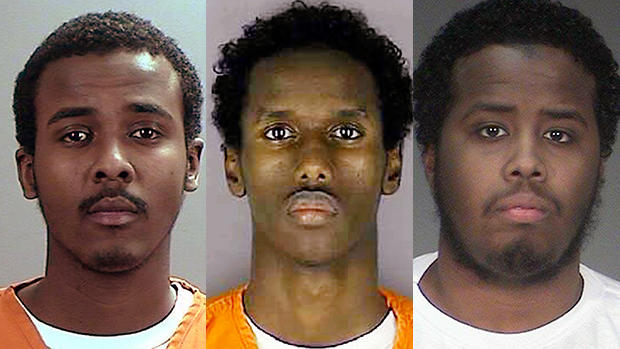Federal jury hands up verdicts in Minnesota ISIS case
MINNEAPOLIS -- Three Minnesota men accused of plotting to go to Syria to join the Islamic State of Iraq and Syria, or ISIS, were convicted Friday of conspiracy to commit murder overseas.
A federal jury convicted Guled Ali Omar, 21, Abdirahman Yasin Daud, 22, and Mohamed Abdihamid Farah, 22, of the most serious charges they faced. Conspiracy to commit murder outside the U.S. carries the possibility of life in prison. They were also convicted of other counts, including conspiracy to provide material support to a foreign terrorist organization and attempting to provide such support.
Daud was found not guilty on one count of perjury.
Two people left a row reserved for family members in tears after the verdicts were read, but the defendants were stoic. Farah waved goodbye to supporters as he was being led out, and Omar smiled at family members.
U.S. District Judge Michael Davis didn't immediately set a sentencing date, saying he wanted to review the case and hear from the defendants.
Prosecutors have said the men were part of a group of friends in Minnesota's Somali community who inspired and recruited each other to join ISIS. A total of 10 young men were accused in the conspiracy; six have pleaded guilty to one count each of conspiracy to support a foreign terrorist organization. A seventh, 22-year-old Abdi Nur, is at large, believed to be in Syria.
Others who were part of the group but have not been charged were successful in going overseas.
The FBI has said roughly a dozen young men and women left Minnesota to join militants in Syria in recent years. And since 2007, more than 22 men have joined al-Shabab in Somalia.
Prosecutors built their case largely on recordings made by a friend of the men who became a paid informant. Testimony at trial showed he was paid roughly $119,000.
Defense attorneys argued that comments on the recordings were youthful bluster. Family and friends have protested what they call entrapment, and said most of the defendants were in their teens when they were caught up in ISIS' social media recruitment campaign.
Minnesota's case was the third ISIS-related case to go to trial nationwide, and is unique because of the sheer number of people who were connected to each other on a personal level. In other cases, most recruitment has been done online.
